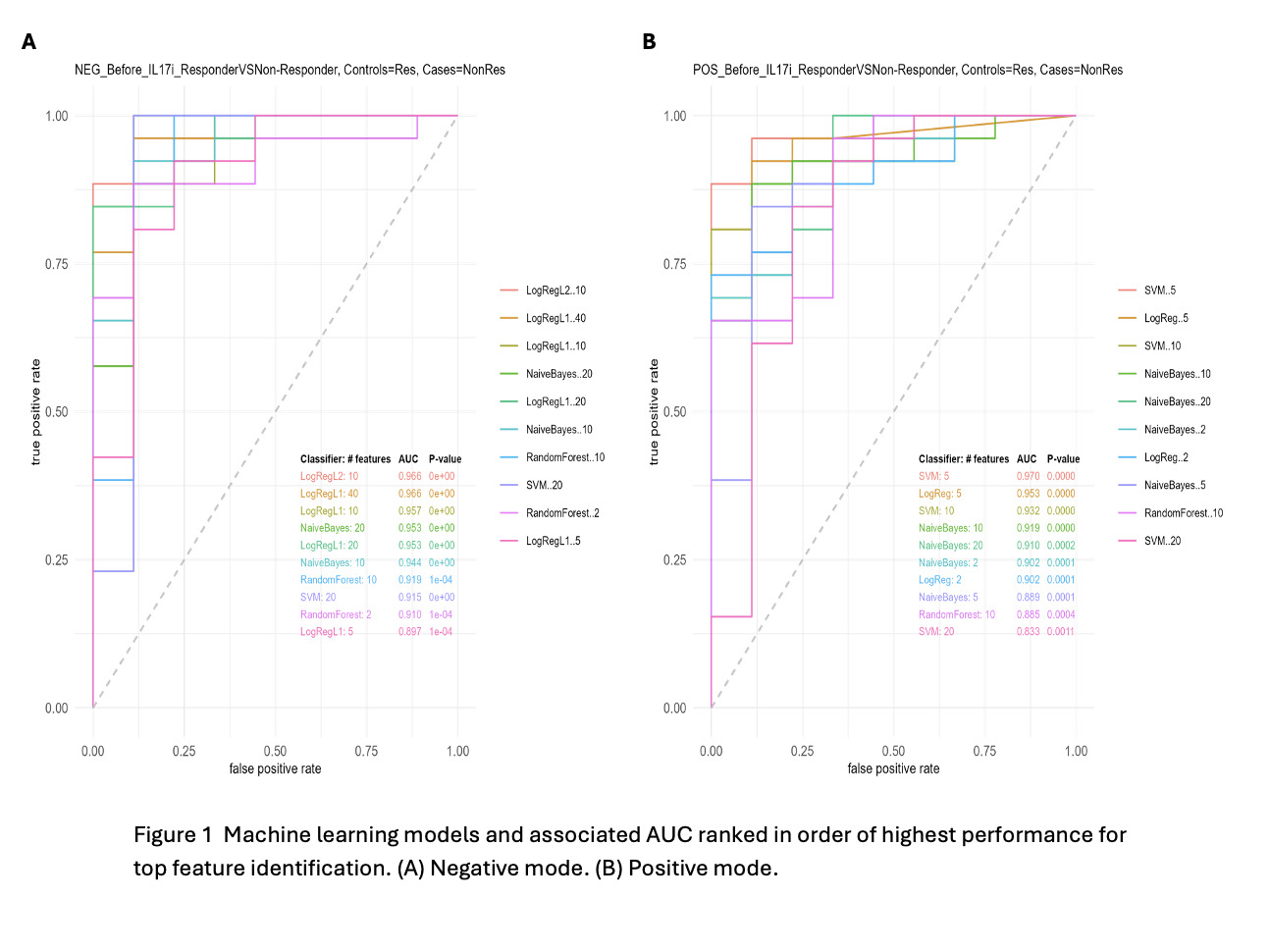Session Information
Session Type: Poster Session C
Session Time: 10:30AM-12:30PM
Background/Purpose: There is an unmet need to improve treatments for patients with Psoriatic Arthritis (PsA). Biologic disease-modifying antirheumatic drugs (bDMARDs) such as interleukin-17 inhibitors (IL-17i) are key therapeutics for PsA patients. There is limited knowledge of markers that predict response to treatment. This study aims to identify serum metabolite markers associated with treatment response to IL-17i at baseline and post treatment to improve treatment plan selection and patient outcomes.
Methods: In this study, 35 patients (18 males, 17 females with swollen joint count mean 1.83, (SD=3.14), tender joint count mean 5.03, (SD=7.14), mean 5.85 (SD=11.91) PASI) were treated with were included. Serum samples were collected at baseline and 3-months post treatment. Patients were classified as responders or non-responders based on clinician evaluations and Disease Activity Index for Psoriatic Arthritis (DAPSA) scores taken pre- and post-treatment. To determine predictive and indicative markers of response to treatment, comparisons were made at baseline and post-treatment between responders vs non responders. Samples were prepared and analysed using solid-phase microextraction coupled to Liquid Chromatography-High Resolution Mass Spectrometry (LC-MS) in negative and positive modes through an untargeted metabolomics approach. Machine learning methods were used to investigate key metabolomic distinctions between responders and non-responders pre- and post treatment. The top features from machine learning models were then tentatively identified.
Results: When comparing non responders (n = 26) vs responders (n = 9) comparison, LogRegL2 (AUC = 0.966) was the highest-performing model for negative mode data (10 features), while SVM (AUC= 0.970) was the highest-performing model for positive mode data (5 features). Some of the features tentatively identified like O-Propanoyl-D-carnitine; 17-Hydroxyprogesterone; L-Tyrosine are connected to other diseases like type 2 diabetes, rheumatoid arthritis, inflammatory bowel disease, Crohn’s disease, and obesity. Other tentatively identified metabolites included creatinine, a biomarker for chronic kidney disease. Interestingly, cystine one of the potential metabolites plays a role in the detoxification pathway for dermatophytes.
Conclusion: An untargeted metabolomics approach was employed to uncover potential predictive and indicative markers and of IL17i treatment response in patients with PsA. Potential metabolites belonging to classes like fatty acyls and carboxylic acids and derivatives have been tentatively identified and associated with the PsA serum metabolome and response to bDMARDS like TNFi and IL-17i. Closer examination and validation of the circulating metabolites in PsA patients are ongoing.
To cite this abstract in AMA style:
Cave A, Li S, Looby N, Kotiyar M, Jurisica I, Kulasingam V, Rahman P, Chandran V. Predictive Potential of Serum Metabolites Associated with Treatment Response to Interleukin -17 Inhibitors in Patients with PsA [abstract]. Arthritis Rheumatol. 2024; 76 (suppl 9). https://acrabstracts.org/abstract/predictive-potential-of-serum-metabolites-associated-with-treatment-response-to-interleukin-17-inhibitors-in-patients-with-psa/. Accessed .« Back to ACR Convergence 2024
ACR Meeting Abstracts - https://acrabstracts.org/abstract/predictive-potential-of-serum-metabolites-associated-with-treatment-response-to-interleukin-17-inhibitors-in-patients-with-psa/

